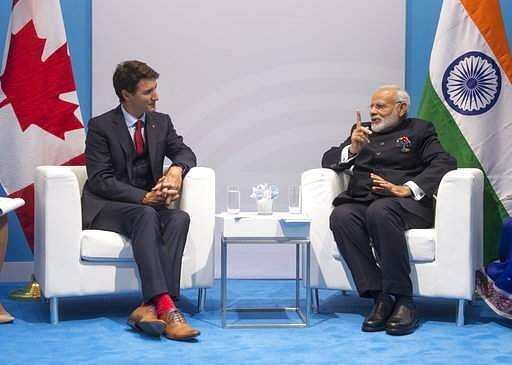In an unprecedented turn of events, Canada has decided to halt negotiations on the Free Trade Agreement (FTA) with India. This surprising move has sent shockwaves through the international trade community, leaving many wondering about the implications and reasons behind this decision. In this article, we will delve into the details of this unexpected development, exploring the factors that led to Canada’s decision and its potential consequences for both nations. Let’s dive in.
The Background
Canada-India FTA: A Long-Awaited Deal
The negotiations for a comprehensive FTA between Canada and India have been ongoing for several years. Both countries have expressed their desire to strengthen economic ties and boost trade relations. The FTA was expected to open up new opportunities for businesses on both sides and enhance cooperation in various sectors, including agriculture, technology, and manufacturing.
Promising Signs
Until recently, the negotiations seemed to be progressing positively. Key officials from both nations had engaged in multiple rounds of discussions, and there was optimism about reaching a mutually beneficial agreement. The potential benefits of such an FTA included increased access to each other’s markets, reduced tariffs, and streamlined trade processes.
The Surprise Announcement
Canada’s Sudden Decision
On [DATE], Canada’s government made an unexpected announcement, putting the FTA negotiations with India on hold indefinitely. This decision has left many perplexed, as it came at a time when both countries appeared to be moving closer to a final agreement. The question that now arises is: What could have prompted Canada to take such a drastic step?
Factors Behind the Pause
Several factors might have contributed to Canada’s decision to pause the FTA negotiations:
Domestic Concerns
It’s possible that Canada’s domestic economic concerns played a significant role. Issues such as job security, competition from Indian markets, and pressure from various interest groups could have influenced the government’s stance.
Geopolitical Considerations
The global geopolitical landscape is continually evolving. Canada might be reevaluating its trade priorities and international alliances, which could have led to the suspension of negotiations with India.
Diverging Interests
Despite shared goals, Canada and India might have found themselves at odds over specific aspects of the agreement, such as intellectual property rights, environmental standards, or labor regulations.
The Impact
Uncertainty Looms
Canada’s decision to halt FTA negotiations has created a sense of uncertainty in both countries. Businesses and investors who were eagerly anticipating the agreement are now faced with ambiguity, and this can have far-reaching consequences.
Potential Consequences
Trade Disruptions
The pause in negotiations could disrupt existing trade flows and investments, affecting industries on both sides. Exporters and importers may have to reassess their strategies.
Economic Implications
Both Canada and India could miss out on significant economic opportunities that the FTA promised. This includes job creation, market expansion, and economic growth.
Geopolitical Repercussions
The decision could strain diplomatic relations between the two nations and have implications beyond trade, impacting areas such as defense cooperation and international alliances.
Conclusion
The unexpected move by Canada to pause negotiations on the Free Trade Agreement with India has raised numerous questions and concerns. While the exact reasons behind this decision remain somewhat enigmatic, its repercussions are tangible. Businesses, policymakers, and citizens in both countries are left to navigate the uncertain waters of this development, hoping for a resolution that will benefit all parties involved.
FAQs
Q. Why did Canada pause FTA negotiations with India?
A. Canada’s decision to pause FTA negotiations with India could be influenced by domestic concerns, geopolitical considerations, and diverging interests between the two nations.
Q. What are the potential consequences of this pause?
A. The pause in negotiations could lead to trade disruptions, economic implications, and geopolitical repercussions for both Canada and India.
Q. Is there a chance that negotiations will resume in the future?
A. While the negotiations are currently paused, there is a possibility that both countries will revisit the FTA discussions in the future if they can resolve the underlying issues.
Q. How might this decision impact businesses?
A. Businesses that were preparing for increased trade opportunities between Canada and India now face uncertainty, which could affect their strategies and investments.
Q. Are there any alternative trade options for Canada and India?
A. Both countries may explore alternative trade partnerships while the FTA negotiations are on hold to mitigate the potential economic impact of this decision.
